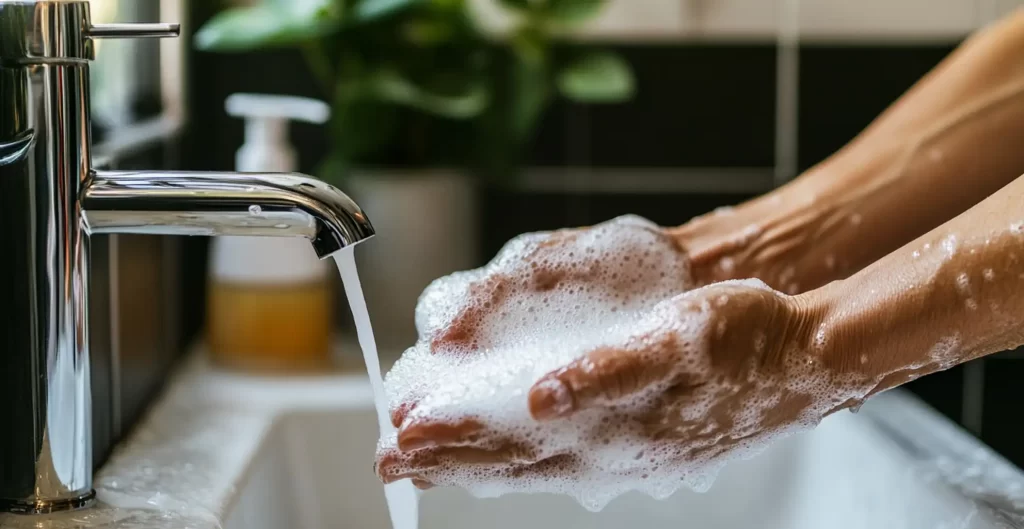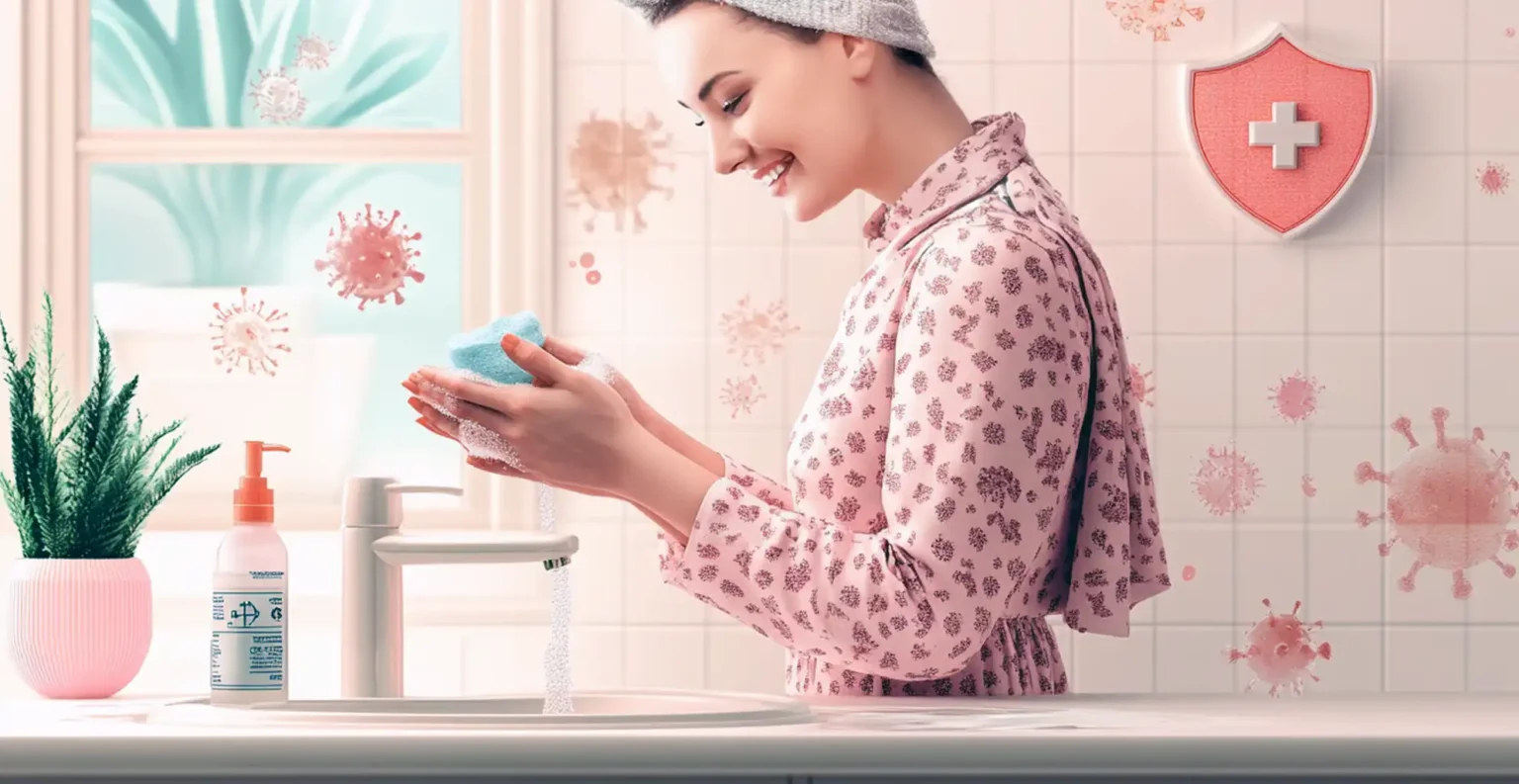Staying safe from infections is crucial when you have cancer. With a weakened immune system, even everyday germs can lead to serious health complications. That’s why learning how to “skip the germs” with smart hygiene and safety habits is essential.
In this article, you will learn:
- Simple hygiene habits that reduce your risk of infection.
- Safe food choices to avoid harmful bacteria.
- Best practices for staying protected in public and at home.
Let’s dive into the most effective ways to skip the germs and stay healthy during cancer treatment.
🧼 Practice Proper Hygiene to Skip the Germs
Good hygiene isn’t just a habit—it’s a shield against harmful infections, especially when your immune system is weakened by cancer treatment. By following these essential hygiene practices, you can effectively skip the germs and reduce your risk of illness.
👐 Master the Art of Handwashing
Your hands touch countless surfaces—and germs—throughout the day. Proper handwashing removes bacteria and viruses before they reach your body. Here’s how to do it right:
- Wash often: Before eating, after using the bathroom, after coughing or sneezing, and whenever you return home.
- Use soap and warm water: Scrub for at least 20 seconds, covering palms, fingers, and under nails.
- Rinse and dry thoroughly: Germs spread more easily on damp hands.
💡 Pro tip: Hum the “Happy Birthday” song twice to time your handwashing.
🤲 Use Hand Sanitizer Correctly (When Soap Isn’t Available)
- Choose an alcohol-based sanitizer (at least 60% alcohol).
- Use a quarter-sized dollop and rub thoroughly, covering both palms, backs of hands, and between fingers.
- Let it air-dry—don’t wipe it off prematurely.
💡 Remember: Hand sanitizer doesn’t remove all germs (like norovirus), so washing with soap is always best when possible.
🧴 Keep Your Skin Healthy and Germ-Resistant
Cracked, dry skin provides entry points for germs. Keep your skin soft and healthy:
- Moisturize after every wash: Use a fragrance-free, hypoallergenic lotion to prevent dryness.
- Avoid harsh soaps: Use gentle, pH-balanced cleansers suitable for sensitive skin.
💡 Apply moisturizer immediately after washing, while skin is still damp, to lock in moisture.
🧽 Disinfect Surfaces to Eliminate Germ Hotspots
Germs can live on surfaces for hours—or even days. Regular cleaning is essential:
- Daily disinfection: Clean high-touch surfaces such as light switches, phones, remotes, and countertops.
- Use EPA-approved disinfectants or make your own solution with 1 part bleach to 9 parts water.
- Sanitize your phone: Use disinfecting wipes or alcohol-based screen cleaners.
💡 When dining out, use a disinfecting wipe to clean tables, menus, and utensils before use.
🧤 Wear Protection When Necessary
- Gloves: Use disposable gloves when cleaning or caring for wounds.
- Face masks: Wear a mask if you are in a crowded area, especially during flu season.
💡 Change masks if they become damp and dispose of single-use masks properly.
🚫 Avoid Germ-Spreading Habits
- Don’t touch your face (especially your eyes, nose, and mouth) with unwashed hands.
- Cover your mouth with a tissue or your elbow when coughing or sneezing.
- Regularly clean and replace personal hygiene items like toothbrushes and razors.

🥦 Maintain Safe Food Practices to Skip the Germs
Food safety is crucial for cancer patients, as contaminated food can introduce harmful bacteria and viruses into your weakened system. By adopting these safe food habits, you can skip the germs and reduce your risk of foodborne illnesses.
🚫 Avoid High-Risk Foods
Some foods are more likely to carry harmful bacteria, especially when raw or undercooked. Here’s what to skip:
- Raw or undercooked seafood: Avoid sushi, sashimi, oysters, and clams. They may carry bacteria like Salmonella or Vibrio.
- Unpasteurized dairy products: Steer clear of soft cheeses like brie, feta, queso fresco, and raw milk yogurt, which can contain Listeria.
- Raw or lightly cooked sprouts: Sprouts like alfalfa or mung beans grow in moist conditions, ideal for bacteria like E. coli and Salmonella.
💡 Tip: Always check labels for “pasteurized” on dairy products.
🍳 Cook Foods to Safe Temperatures
Proper cooking kills harmful pathogens. Use a food thermometer and follow these temperature guidelines:
- Poultry (chicken, turkey): 165°F (75°C)
- Ground meat (beef, pork, lamb): 160°F (71°C)
- Whole cuts of beef, pork, veal, lamb: 145°F (63°C) with a 3-minute rest time
- Fish and shellfish: 145°F (63°C) or until opaque and flaky
💡 Tip: Invest in a digital meat thermometer for accuracy.
🥗 Wash Fresh Produce Thoroughly
Fruits and vegetables can carry germs from soil or handling. Here’s how to skip the germs:
- Rinse under running water: Even if you plan to peel them. This prevents germs on the skin from transferring to the flesh.
- Use a brush for firm produce: Scrub items like potatoes, carrots, and cucumbers.
- Dry with a clean cloth or paper towel: This removes lingering bacteria.
- Avoid pre-cut fruits and vegetables: They have more surface area for bacteria to grow.
💡 Tip: Wash bananas and oranges before peeling to prevent hand contamination.

❄️ Store Food Safely
Bacteria multiply quickly at unsafe temperatures, so proper storage is essential:
- Keep cold foods cold: Refrigerate perishable items at or below 40°F (4°C).
- Separate raw and cooked foods: Use different containers and cutting boards to prevent cross-contamination.
- Refrigerate leftovers promptly: Within 2 hours, or within 1 hour if the room temperature is above 90°F (32°C).
💡 Tip: Label leftovers with dates and discard after 3 days.
🧼 Practice Safe Food Handling
Keep your kitchen clean and your food preparation habits safe:
- Wash hands before and after handling food—especially raw meat.
- Sanitize countertops and cutting boards with a mild bleach solution (1 tablespoon of bleach per gallon of water).
- Use separate knives for raw meats and vegetables to prevent cross-contamination.
- Thaw food safely: In the refrigerator, not on the countertop.
🚷 Minimize Exposure in Public and Skip the Germs
When you’re undergoing cancer treatment, public spaces can be hotspots for germs. By adopting smart habits, you can safely navigate public settings and skip the germs that pose a risk to your weakened immune system.
😷 Wear a Mask for Protection
- Choose the right mask: Use an N95 or KN95 mask for the best protection, especially in crowded places.
- Wear it correctly: Cover your nose, mouth, and chin without gaps.
- Change masks regularly: Replace disposable masks daily and wash reusable ones after each use.
💡 Tip: Carry extra masks in a sealed bag when going out.
🧍♂️↔️🧍♀️ Practice Social Distancing
- Keep at least 6 feet away from others, especially indoors.
- Avoid crowds and poorly ventilated areas: Opt for outdoor activities whenever possible.
- Limit close contact: Skip handshakes and hugs—elbow bumps are safer.
💡 Tip: Use apps to check crowd levels before visiting public places.
🧽 Disinfect Frequently-Touched Surfaces
- Carry disinfecting wipes: Use them to clean shopping carts, door handles, and restaurant tables.
- Sanitize your phone: Wipe your phone screen daily—it touches your face more than you realize!
- Use contactless payment methods whenever possible.
💡 Tip: Press elevator buttons with your knuckle to reduce contact with your fingertips.
🚗 Travel Safely and Germ-Free
- In public transport: Wear a mask, avoid touching surfaces, and sanitize your hands after every trip.
- In taxis or ride-shares: Sit in the back seat, open windows for ventilation, and wipe down seatbelt buckles.
- On airplanes: Bring disinfecting wipes and clean your seatbelt, armrests, and tray table before use.
💡 Tip: Ask for an aisle seat to avoid contact with multiple passengers.
🚫 Limit Visits to High-Risk Places
- Avoid crowded venues: Stay away from restaurants, bars, theaters, and salons, where germs spread easily.
- Choose off-peak hours: If grocery shopping is necessary, visit during times with fewer customers.
- Opt for delivery services: Use online shopping for groceries, prescriptions, and essentials.
💡 Tip: Schedule doctor appointments early in the day to reduce exposure from waiting rooms.
💡 Set Boundaries with Visitors
- Limit in-person visits: Encourage virtual meetups via video calls.
- Screen visitors for illness: Politely ask guests not to visit if they feel unwell.
- Provide hand sanitizer at the door: Ensure anyone entering your space sanitizes their hands.
💡 Tip: Place a sign on your front door reminding visitors of your safety rules.
🐾🩹 Be Cautious with Pets and Wounds
• Safe Pet Hygiene Habits to Reduce Exposure to Bacteria 🧼🐾:
Maintaining good hygiene with your pets is essential in reducing the risk of bacterial infections. Regularly bathe and groom your pets, ensuring they are free from parasites like fleas and ticks.
Clean their paws after outdoor walks, and keep their living areas sanitized. Additionally, avoid letting your pet lick open wounds, as their mouths can harbor harmful bacteria.
• How to Care for Minor Cuts and Scrapes to Prevent Infection 💉🩹:
Even minor cuts and scrapes can become infected if not treated properly. Clean the wound immediately with mild soap and water, and apply an antiseptic ointment. Cover the wound with a sterile bandage to protect it from dirt and bacteria. Keep an eye on the wound for any signs of infection, such as redness, swelling, or increased pain, and seek medical attention if necessary.
• Avoiding High-Risk Activities 🧤🌱:
Certain activities can increase the risk of exposure to harmful bacteria. When gardening, always wear gloves to protect your hands from cuts and soil-borne germs. Similarly, cleaning litter boxes can expose you to harmful bacteria and parasites, so wear gloves and wash your hands thoroughly afterward. Taking these precautions will help minimize the chances of developing an infection.
💉🩺 Stay Up-to-Date with Vaccinations and Medical Advice
• Vaccines That Are Safe and Recommended (Flu, Pneumonia, COVID-19) 🦠💉:
Vaccinations play a crucial role in maintaining a strong immune system, especially for individuals with weakened immunity or those undergoing cancer treatment. Vaccines like the flu shot, pneumonia vaccine, and COVID-19 vaccine are highly recommended, as they can significantly reduce the risk of severe illness from these infections.
Flu vaccines help protect against seasonal outbreaks, while pneumonia vaccines safeguard against pneumonia-causing bacteria, which can be particularly dangerous for immunocompromised individuals. The COVID-19 vaccine is essential for reducing the risk of severe symptoms and complications. Make sure to stay updated on vaccine schedules and follow your healthcare provider’s guidance on booster shots to stay well-protected.
• Why Discussing Antibiotics with Your Oncologist Is Crucial 🦠💬:
Cancer treatments, such as chemotherapy, can make your body more vulnerable to infections due to their impact on the immune system. This is why it’s essential to discuss antibiotic use with your oncologist. Overuse or misuse of antibiotics can lead to antibiotic resistance, making infections harder to treat.
Your oncologist can provide personalized advice on when antibiotics are necessary, which specific antibiotics are most effective, and how to avoid unnecessary exposure. It’s also important to alert your oncologist to any signs of infection, so they can help you manage your treatment plan appropriately and prevent complications.
• How to Monitor for Early Signs of Infection 👀🩺:
Early detection of infection is key to preventing it from escalating into something more serious. Monitor your body closely for any unusual symptoms, such as fever, chills, fatigue, or redness and swelling around a wound. Pay attention to any changes in your skin, as well as signs of respiratory distress like coughing or shortness of breath.
If you notice any of these symptoms, it’s important to seek medical advice immediately. Early intervention can help you avoid complications and receive timely treatment to stay on track with your recovery. Always keep communication lines open with your healthcare team and report any health changes promptly.
❓ FAQ Section
1. Why is hygiene especially important during cancer treatment?
Cancer treatments, like chemotherapy, can weaken your immune system, making it harder for your body to fight off infections. Practicing proper hygiene—such as regular handwashing, disinfecting surfaces, and wearing protective gear—can help prevent exposure to harmful bacteria and viruses, keeping you healthier during your treatment.
2. How can I protect myself from foodborne illnesses while undergoing cancer treatment?
To avoid harmful bacteria, steer clear of high-risk foods such as raw or undercooked seafood, unpasteurized dairy, and raw sprouts. Always cook foods to the recommended safe temperatures, wash produce thoroughly, and store food properly. These precautions can help you avoid foodborne infections and stay protected during treatment.
3. Is it safe to go out in public during cancer treatment?
Public places can be hotspots for germs, so it’s important to take extra precautions. Wear a mask (preferably an N95 or KN95) in crowded areas, practice social distancing, and disinfect frequently touched surfaces. Limiting visits to high-risk locations and opting for off-peak times can also help minimize your exposure to infections.
4. How can I safely care for pets during cancer treatment?
Maintaining good hygiene with your pets is essential. Clean your pet regularly, disinfect their paws after outdoor walks, and avoid letting them lick any open wounds. If you handle litter boxes, wear gloves and wash your hands thoroughly afterward to reduce the risk of bacteria.
5. Should I talk to my oncologist about taking antibiotics?
Yes! It’s crucial to discuss antibiotic use with your oncologist, as cancer treatments can make your immune system more vulnerable to infections. Overuse or misuse of antibiotics can lead to resistance, making infections harder to treat. Your oncologist can guide you on when antibiotics are necessary and which ones are most effective.
6. What are the signs of infection I should watch for during treatment?
Monitor for symptoms such as fever, chills, redness or swelling around wounds, or any changes in your skin. Respiratory distress, like coughing or shortness of breath, is also a sign to watch for. Early detection is key—if you notice any unusual symptoms, contact your healthcare provider immediately for advice.
7. What vaccines should I get during cancer treatment?
It’s recommended to stay up-to-date on vaccines such as the flu vaccine, pneumonia vaccine, and COVID-19 vaccine. These vaccines help reduce the risk of severe illness, especially in immunocompromised individuals. Be sure to discuss vaccine options and schedules with your healthcare provider for personalized advice.
8. Can I continue my normal diet during cancer treatment?
While undergoing cancer treatment, it’s essential to follow safe food practices. Avoid high-risk foods, cook your meals to the proper temperatures, wash produce thoroughly, and store food safely. By making these adjustments, you can reduce the risk of foodborne illnesses while maintaining a healthy diet.
9. How can I stay healthy while traveling during cancer treatment?
When traveling, whether by public transport or car, wear a mask, avoid touching surfaces, and sanitize your hands regularly. In taxis, ride-shares, or airplanes, wipe down seats, seatbelts, and trays. Limiting contact with others and traveling during off-peak hours can further reduce your exposure to germs.
📝💡 Conclusion
• Briefly Summarize the Three Most Important Takeaways from the Article:
- Prioritize hygiene and safety around pets and wounds: Keeping your pet’s hygiene in check and caring for minor cuts and scrapes promptly is essential to avoid infections that could complicate cancer treatment.
- Stay updated with vaccinations: Vaccines like flu, pneumonia, and COVID-19 help reduce the risk of severe illness, especially for those with weakened immune systems. Regular consultations with your healthcare team ensure you stay on top of necessary vaccines.
- Discuss antibiotics with your oncologist: Clear communication with your oncologist about antibiotic use is crucial to avoid resistance and ensure you’re receiving the right treatment at the right time, especially during cancer treatments that can compromise your immune system.
• Propose a Natural Next Step for the Reader’s Journey:
Now that you’re equipped with the essential information to protect your immune health during cancer treatment, learn how to boost your immune system naturally to further enhance your recovery and well-being. Understanding lifestyle choices and natural remedies can make a world of difference in supporting your body through this challenging time. Stay proactive, stay informed, and continue your journey to wellness.

